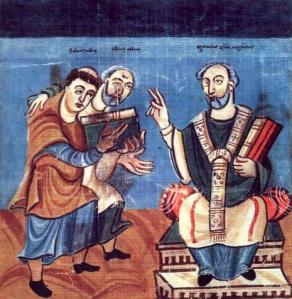 Let me summarise briefly everything that is said about Samson.
Let me summarise briefly everything that is said about Samson.
Samson, who in his day was a Nazirite of the Lord, is allegorically a type of Christ; first, because his birth was foretold by an angel;
secondly, because he was called a Nazirite and delivered Israel from its foes;
and, finally, because he overthrew their Temple, causing many thousands of people who had mocked him to perish.
As the birth of Samson was foretold by an angel, so the Lord’s bodily birth was foretold by the Prophets, as well as by the angel who said to Mary:
Hail, Mary, full of grace; you have conceived in your womb and will bear a son, and you shall call him ‘Emmanuel’, for he shall save his people from their sins.
The name ‘Samson’ means ‘sun’.
But our Redeemer too is called ‘sun’; listen to how the Prophet thus names the Lord Jesus: The sun of righteousness shall rise over you, and there will be healing in its wings.
The Lord Jesus is truly the Sun of Righteousness, for he enlightens the minds of all believers with heavenly light.
He is the true Nazirite and Holy one of God, and it is only by analogy with him that this other man was called a Nazirite.
When Samson was travelling to the wedding he encountered a roaring lion. As he travelled to a foreign people in quest of a wife, a lion came out to meet him and he killed it.
Who should we see foreshadowed by Samson if not Christ who, when about to gather the Church from among the Gentiles, said: Rejoice, for I have overcome the world.
What does it mean that Samson took honey from the mouth of the slain lion except that, as we ourselves see, the nations of the earthly kingdom who formerly raged against Christ have lost their savagery and, moved by the sweetness of the Gospel preaching make their votive offerings?
Also significant is what we see in Samson’s own person: he killed few in his lifetime, but countless were the enemies he slew when he died by destroying the Temple.
So too the Lord in his lifetime rescued few from the arrogance of unbelief, but he rescued many when the temple of his body was destroyed;
and those Gentiles who were arrogant and whom he bore with in his lifetime, he laid low by his death.
Rabanus Maurus (c.780-856): Commentary on Judges, 2.20 (PL 108:1198); from the Monastic Office of Vigils, Sunday of Week 12 in Ordinary Time, Year1.








